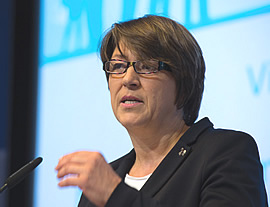 No matter our background, location or income – mobility and transport affects our daily lives. Changes to how the transport network operates in Europe can often be an emotive issue. However, reform to how the system works currently is necessary. We cannot maintain the status quo and maintain the planet for future generations. The EU played a central role in brokering a historic climate deal at the COP21 in Paris, where 195 countries adopted a new universal, legally binding global climate deal. It is my intention, as European Commissioner for Transport to build on this momentum.
No matter our background, location or income – mobility and transport affects our daily lives. Changes to how the transport network operates in Europe can often be an emotive issue. However, reform to how the system works currently is necessary. We cannot maintain the status quo and maintain the planet for future generations. The EU played a central role in brokering a historic climate deal at the COP21 in Paris, where 195 countries adopted a new universal, legally binding global climate deal. It is my intention, as European Commissioner for Transport to build on this momentum.
The EU has set targets to reduce greenhouse gas emissions by 40 per cent overall by 2030 (on 1990 levels) and transport – which accounts for 24 per cent of CO2 emissions in the EU – has its part to play.
To reach our targets, significant changes will have to occur. New technology, for example to increase the share of renewable energies in transport or make vehicles and vessels more energy efficient, will play a central role as we decarbonise our transport network to better serve the needs of people and business. Investment will be vital, as well as a regulatory framework that allows Europe's pool of talented people and companies the freedom to innovate and provide mobility solutions and services.
There will also be a need to organise our transport system differently, to make a greater use of less greenhouse gas intensive modes such as inland waterways or railways, plan our cities better to allow for a greater share of walking and cycling, and better integrate the different means of transport to get the right mix.
But for now let us look a little closer at each of the four main modes of transport.
On road, the European Union has set CO2 emissions standards for vehicles. There are targets running until 2021. By that year, the average emissions of new cars sold in the EU (per manufacturer) will be 95 grammes of CO2 per kilometre, compared to 124 grammes today. Changes to the procedure to test emissions will soon enter into force and will guarantee a more accurate assessment of car emissions. We will also need to improve the efficiency of road transport operations, avoiding empty runs and stimulating fleet renewals. Strengthening public transport is particularily important in that respect. And if we want to increase the demand for vehicles using alternative energies, a critical condition is sufficient infrastructure for recharging and refuelling. In 2014 the EU adopted a framework for creating this infrastructure which Member States are now implementing.
In the skies, much is being done to reduce the impact of aviation emissions. In order to be effective, my preference is to tackle CO2 emissions from aviation through global action, as aviation is global by nature. We are working closely with the International Civial Aviation Organisation (ICAO) on two ambitious global measures. The first is on a CO2 Standard for aircraft, where a landmark agreement was reached at expert level at ICAO in February. It could save up to 650 million tonnes of CO2 emissions by 2040.
The second is to develop a global mandatory system to offset aviation emissions. The goal is to achieve carbon neutral growth from 2020 in a cost-effective manner. I also welcome the recent news by an EU airline taking the first steps to develop a hybrid plane. In the medium term alternative propulsion systems will have to be developed to make aviation more sustainable, in view of the ever increasing demand for flights.
On rail, work is progressing on the Fourth Railway Package. Agreement was secured on technical aspects last year, improving interoperability and facilitating the placing on the market of new rolling stocks. Work is ongoing to get agreement on opening up domestic passenger rail markets. There is a need for investment in our rail infrastructure. The Fourth Railway Package provides a framework to attract much needed investment and new operators into the market. Competition has revitalised other sectors and I am confident, if a deal can be reached in the coming months, that rail can be revitalised too.
Briefly to maritime: The major goal for this year is to ensure International Maritime Organisation member states agree on a global CO2 reporting scheme as a first step towards making serious inroads into cutting emissions in this sector. In parallel, the EU and its international partners should start thinking about an effective global measure to reduce CO2 from shipping. Again, the Paris agreement has given renewed impetus in finding a deal.
It is important that challenges are changed into opportunities, so the EU can become more competitive and lead the change globally. I invite industry to come on board, seize the opportunity and maintain the momentum.
Of course, while it is necessary to have strategies to reduce the impact of individual modes of transport, ultimately, we are moving away from the 'silo' mentality of the past. The future of mobility will see carbon-free, smart and seamlessly integrated transport network.
Owning the transport we use, such as cars will be less important. Switching modes will become easier, as real-time information planners become more integrated. Not only will this be good for us as citizens today, but it represents a huge opportunity to reduce the impact of climate change, so we can hand our planet on to the next generation.